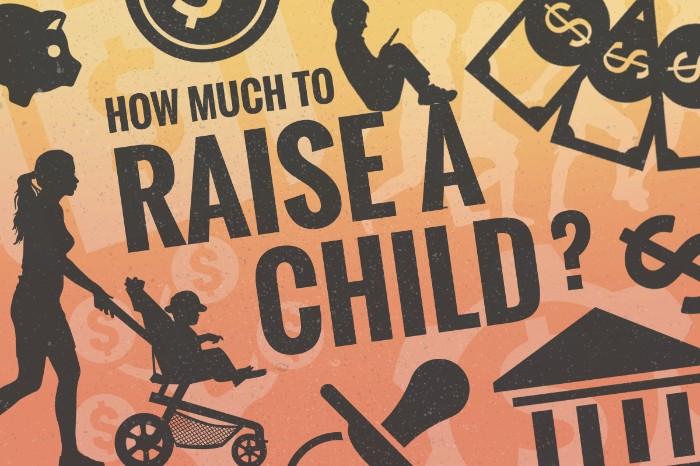Raising a child in the United States is certainly no small feat. From food, clothing, and schooling to housing and transportation expenses, parents bear a significant financial burden to provide their children with proper care and development.
This post explores how these costs impact American households, breaking down the various components that make up the cost of raising a child over time. For newly expecting parents seeking information about what’s coming financially or for those already taking on the challenge of doing it all - read on!
The Average Cost of Raising a Child in the US

The cost of raising a child in the United States is staggering. According to the USDA’s Expenditures on Children and Families report, an average middle-income family spends approximately $12,350 annually for each child or nearly $233,610 from birth through age 17. This includes necessities like food, shelter, child care, and education.
Pre-natal Care and childbirth Costs
Regarding raising a child in the United States, expenses start before birth. Pre-natal care and childbirth are two significant expenses that expectant parents face.
According to the U.S. Department of Health and Human Services, pre-natal care costs can range from nothing to over $3,000, depending on whether the expecting mother has health insurance.
Childbirth expenses can range from $2,500 to over $10,000, depending on whether it is a vaginal delivery or cesarean section and if it is in a hospital or birth center.
The cost of prenatal care will vary depending on location, type of insurance, and the type of provider. Some health plans cover pre-natal care completely; others may require copays or have deductibles that must be met before coverage kicks in. Most birthing centers also offer payment plans to help spread out the cost.
The cost of childbirth depends on factors such as location, whether it is a vaginal delivery or cesarean section, the type of hospital or birth center, and any complications. A vaginal delivery in a low-risk pregnancy typically costs less than a cesarean section.
The cost also varies depending on whether the expecting parents plan to use insurance or pay out-of-pocket. If a family is paying out-of-pocket, they should ask their provider if they offer discounts or payment plans.
The cost of prenatal care and childbirth are only two components of raising a child in the United States. Although these expenses can be significant, they are important investments in parents' and babies' health and well-being.
Housing, Utilities, and Other Living Expenses
Housing, utilities, and other living expenses are some of the most significant financial costs of raising a child. On average, families in the United States spend around $11,000 annually on housing alone.
This includes mortgage payments or rent, property taxes, repairs and maintenance, home insurance premiums, and homeowners’ association fees. Additionally, utilities, including electricity, gas, water, and sewer, can cost an average of $3,500 annually.
Other essential expenses, such as furniture, clothes, and equipment for the family to function (such as computers or appliances), add up quickly and take a significant bite out of the budget. Other costs like food, transportation, medical bills, and entertainment must also be considered.
With careful budgeting and planning, parents can manage these expenses, but it’s important to remember that the costs of raising a child in the United States are significant and require considerable thought and planning.
Education Costs - From Daycare to College Tuition

Education costs are a major concern for many parents in the United States. From daycare tuition to college expenses, these bills can add up quickly and require significant preparation over time.
Daycare is typically one of the more expensive components of raising a child, especially during their earliest years. Costs vary drastically depending on factors such as caretaker experience and the number of children enrolled, but the average cost of full-time daycare for an infant in the United States is estimated to range between $6,000 - $20,000 per year.
As children grow and progress through school, costs like after-school programs and extracurricular activities should be factored into the equation. According to a 2020 report, the average cost of afterschool activities ranges from $800 - $1,200 per child annually.
When it comes time for college tuition, parents should start budgeting early. The College Board’s 2021 Trends in College Pricing report reveals that attending an in-state public four-year university costs an average of $25,900 per year for tuition and fees. These costs typically increase with time, meaning parents should be aware of potential inflation when planning.
Food and Clothing Expenditures
Food and clothing expenditures are some of the most significant costs of raising a child in the United States. According to data from the United States Department of Agriculture, it is estimated that food expenses for children up to age 18 can average between $2,000 to nearly $5,000 per year, depending on the age and gender of the child.
It is important to factor in the cost of groceries, meals, and school lunches, which could add up over time.
Clothing expenses are no less significant than food costs for raising children in the US. The American Express Spending & Saving Tracker reported that parents, on average, spend $2,000 annually on apparel and shoes for their children. This expense can add quickly, especially since children often outgrow clothing and footwear items.
When budgeting for a child's expenses, it is important to factor in the cost of new clothes and emergency replacements throughout the year.
It is essential to keep food and clothing costs in mind when budgeting for raising a child. By doing so, parents can ensure that their children receive proper nutrition and clothing while managing their finances.
Keeping an eye on food and clothing costs and all other expenses associated with raising a child is essential to maintaining financial stability over time.
Healthcare and Insurance Costs
Healthcare and insurance costs are a major part of parents' financial burden when raising a child in the United States.
According to the U.S. Department of Agriculture, healthcare for infants and children can range from about $4,000 to over $12,000 per year – not including any special medical needs that may arise.
Healthcare insurance premiums can also significantly add to the financial burden; the average American family pays around $4,500 annually for healthcare coverage. Additionally, parents must plan for any unexpected medical costs that may arise.
Many families purchase supplemental health and accident insurance policies to minimize out-of-pocket expenses. While these extra costs may be an additional financial burden, they are essential for providing the best care for your children.
FAQs
How do taxes affect the cost of raising a child?
Taxes play an important role in the overall cost of raising a child. Depending on your family’s income, tax credits may be available to offset some of the expenses associated with childcare and education costs and other items like health insurance premiums.
What are the major expenses associated with raising a child?
There are many expenses associated with raising a child. These include food, clothing, education, housing and transportation costs, medical care, recreation, and childcare. It’s important to consider all of these factors when budgeting for the cost of raising a child.
How can I prepare financially for the cost of raising a child?
Creating a budget and setting aside monthly money can help parents prepare for the financial costs of raising a child. Additionally, ensuring you have adequate insurance coverage and emergency savings and seeking advice from financial professionals or taking advantage of resources like 529 plans can help ensure that your finances are for the long term.
Conclusion
Raising a child in the United States can be expensive. When making decisions about their finances, parents must consider the costs of raising a child. From everyday items such as food and clothing to larger purchases such as housing and education, it’s important for parents to adequately plan for the financial needs of their family.




